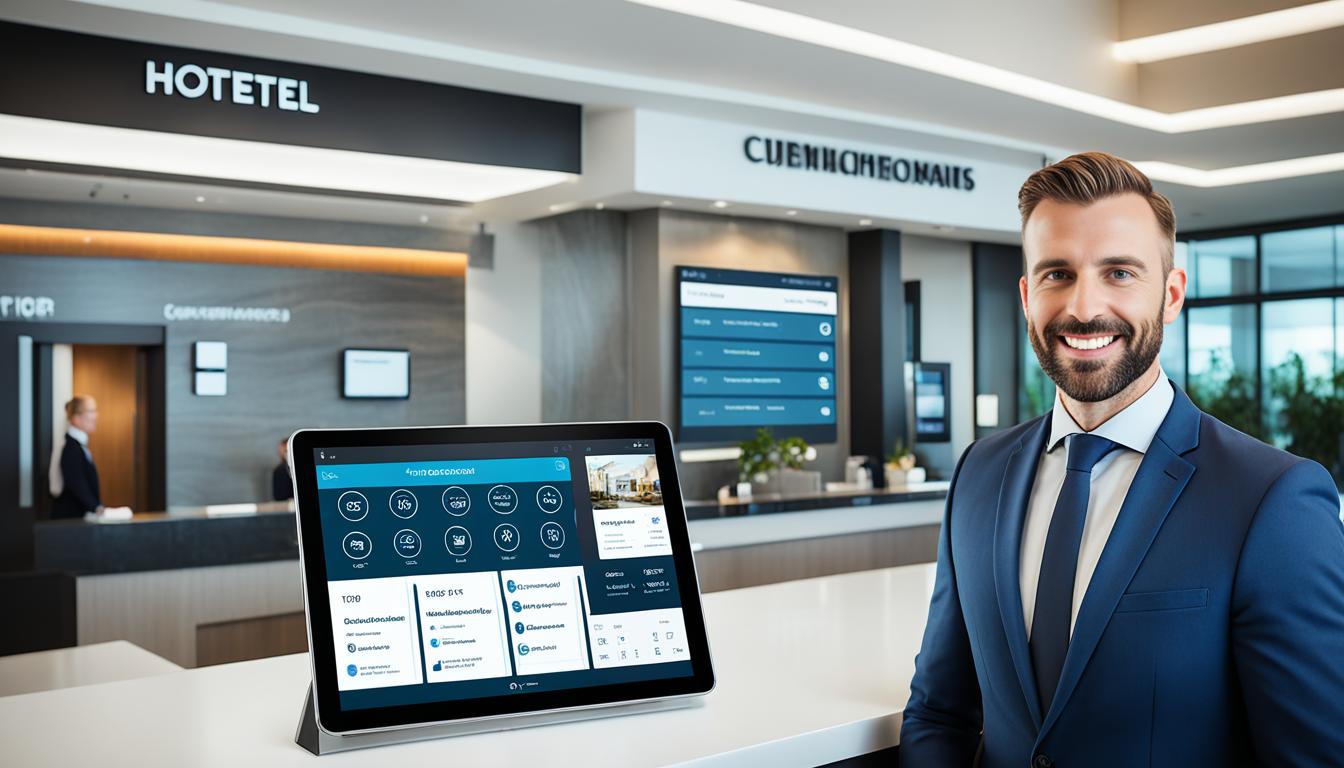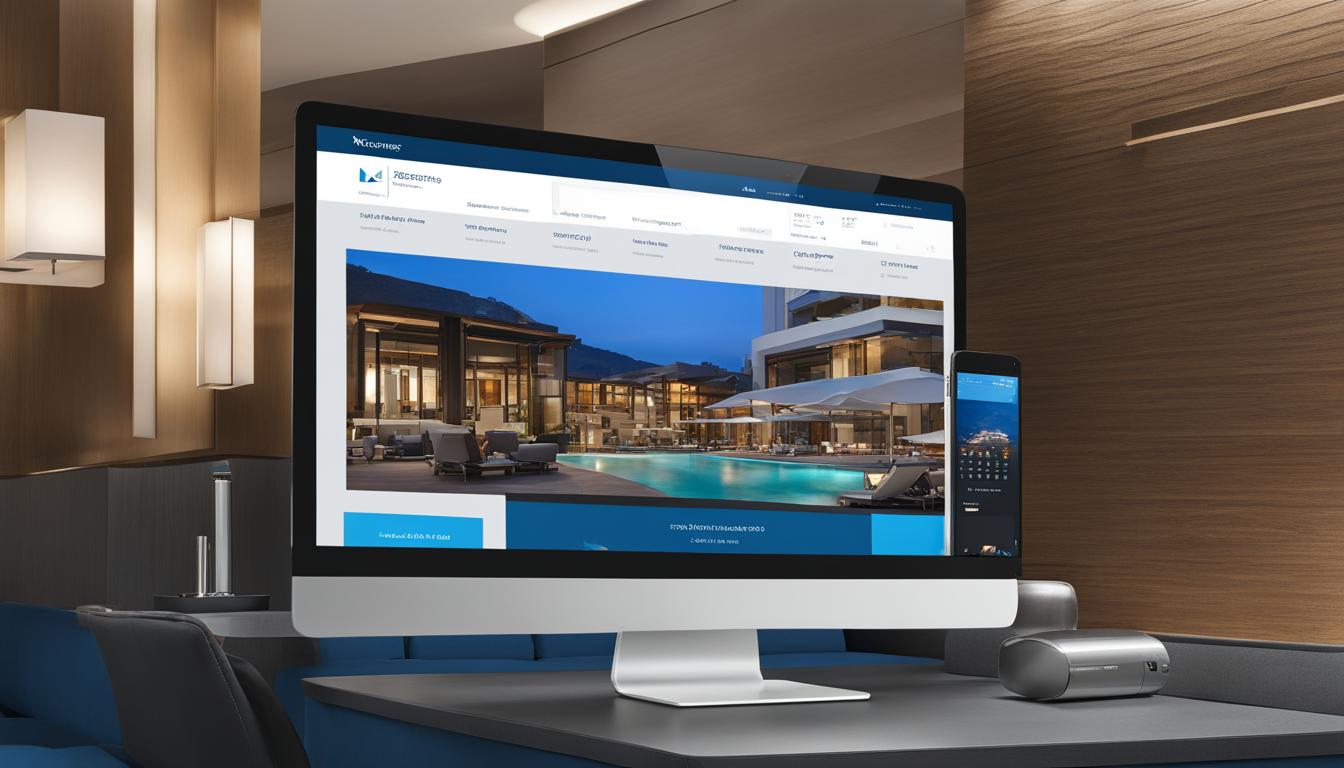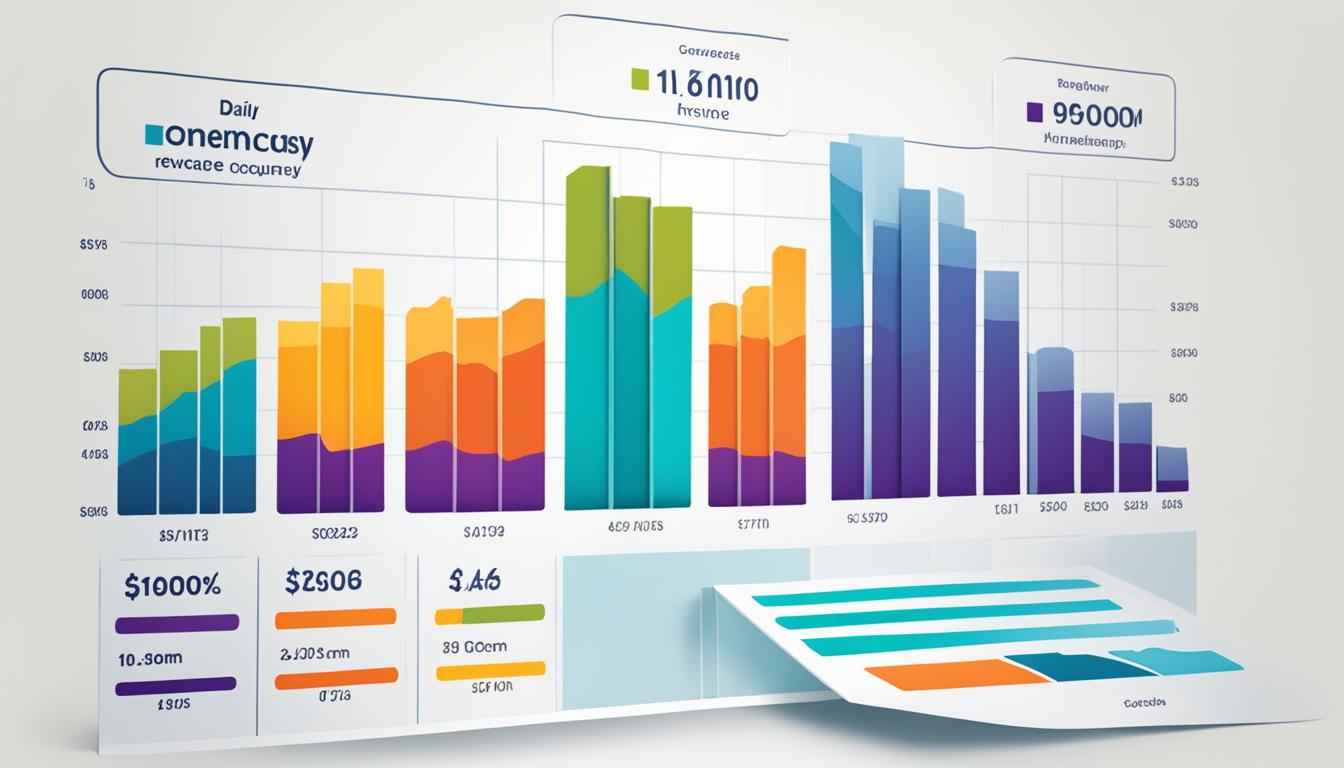Welcome to our comprehensive guide on hotel revenue management strategies. In this article, we will explore how hoteliers can boost hotel profitability through effective revenue management. By implementing the right strategies and leveraging the right tools, hotel owners and managers can maximize their revenue streams and increase their overall profitability.
Hotel revenue management is a crucial aspect of running a successful hotel business. It involves optimizing revenue through pricing strategies, distribution channel management, and overall revenue optimization. By focusing on revenue management, hoteliers can attract more guests, increase direct bookings, and ensure that rooms are sold at the right price to maximize revenue and profitability.
Throughout this guide, we will delve into various aspects of hotel revenue management, starting with an introduction to the concept, followed by tips and strategies to implement. We will also explore key tools like hotel booking engines, channel managers, and website builders that can streamline operations and help enhance revenue streams.
Are you ready to elevate your hotel’s revenue management game? Let’s dive in and explore the world of hotel revenue management and how it can drastically boost your hotel’s profitability.
Understanding Hotel Revenue Management
In today’s competitive hospitality industry, hotel revenue management plays a crucial role in driving profitability. Hoteliers must optimize their revenue streams through effective pricing strategies and revenue optimization techniques. By understanding the fundamentals of hotel revenue management, hoteliers can make informed decisions to maximize their revenue and stay ahead of the competition.
Hotel revenue management involves analyzing market data, understanding customer demand patterns, and setting strategic pricing to maximize revenue. Revenue optimization, one of the key components of revenue management, focuses on maximizing revenues by pricing rooms and services based on demand, availability, and other relevant factors.
Pricing strategy is a vital aspect of hotel revenue management. Hoteliers need to determine the optimal price for their rooms and services to maximize revenue without compromising occupancy rates. This requires a deep understanding of the market, competitor pricing, and customer behavior.
Implementing effective revenue management techniques can have a significant impact on a hotel’s profitability. By leveraging revenue optimization and pricing strategies, hoteliers can optimize their revenue streams and achieve higher overall profitability.
Hotel Booking Engine: Streamlining Direct Bookings
In today’s digital era, a hotel booking engine is a crucial tool for hoteliers looking to streamline their direct bookings and boost revenue. A hotel booking engine is a software platform that allows guests to book rooms directly from a hotel’s website.
By utilizing a hotel booking engine, hotels can reduce their reliance on third-party channels, such as online travel agencies (OTAs), and instead, encourage guests to book directly. This not only helps hotels maintain control over their pricing and inventory but also eliminates the need to pay high commission fees to OTAs.
With a user-friendly booking process, guests can easily select their desired dates, room types, and add-on services before confirming their reservations. The convenience and transparency of direct bookings through a hotel booking engine can significantly enhance the guest experience and build loyalty.
Key Features of an Effective Hotel Booking Engine
When selecting a hotel booking engine, hoteliers should consider several key features to optimize revenue and streamline operations:
- Mobile-friendly: A responsive booking engine that offers a seamless experience across all devices, including smartphones and tablets, is essential in today’s mobile-driven world.
- Real-time availability: The booking engine should synchronize with the hotel’s property management system to display accurate room availability in real-time, preventing overbookings and ensuring a smooth booking process.
- Integration: Seamless integration with the hotel’s website and other systems, such as the channel manager and revenue management software, allows for efficient management of rates, inventory, and reservations.
- Personalization: The ability to offer personalized promotions, discounts, and packages tailored to guest preferences can help drive direct bookings and increase revenue.
- Secure payment processing: A secure and PCI-compliant payment gateway ensures safe transactions and builds trust with guests.
By leveraging a hotel booking engine with these key features, hoteliers can optimize their revenue potential, streamline their operations, and provide a seamless booking experience for guests.
Hotel Channel Manager: Expanding Distribution Channels
A hotel channel manager plays a crucial role in revenue management by enabling hoteliers to expand their distribution channels and reach a wider audience. By utilizing a channel manager, hoteliers can effectively distribute their inventory across online travel agencies and other channels, maximizing their visibility and increasing the chances of bookings.
Online travel agencies (OTAs) are a prominent distribution channel for hotels, attracting a large number of potential guests. With a channel manager, hoteliers can seamlessly connect their property management system (PMS) with multiple OTAs, ensuring real-time availability and rates across all platforms.
Through a user-friendly interface, hoteliers can manage rates, inventory, and restrictions efficiently. With a channel manager, updates made in the PMS are automatically reflected across all connected OTAs, eliminating the need for manual updates and reducing the risk of overbooking.
Having a wide range of distribution channels is essential for hoteliers to increase their reach and tap into various market segments. A channel manager enables hoteliers to connect with multiple OTAs along with other distribution partners, such as global distribution systems (GDS), central reservation systems (CRS), and niche travel websites.
By expanding distribution channels, hoteliers not only reach a broader audience but also diversify their revenue streams. Instead of relying solely on direct bookings or a few OTAs, hoteliers can leverage different distribution channels to attract guests from different markets and increase their booking opportunities.
Benefits of an Effective Channel Manager
An effective channel manager offers numerous benefits to hoteliers in revenue management:
- Maximizing Revenue: With real-time updates and accurate availability, a channel manager ensures optimal yield management, allowing hoteliers to sell at the right price and maximize their revenue potential.
- Reducing Overbookings: By automating inventory updates across all distribution channels, a channel manager eliminates the risk of overbookings, preventing guest dissatisfaction and revenue loss.
- Improving Efficiency: The centralized management of rates, inventory, and restrictions through a channel manager saves time and reduces the chance of errors, enabling hoteliers to focus on other revenue-generating activities.
- Enhancing Competitiveness: By expanding distribution channels, hoteliers can compete effectively in the online marketplace, ensuring their property remains visible and attracts a steady stream of bookings.
An effective hotel channel manager is an invaluable tool for hoteliers looking to optimize revenue and increase profitability by expanding their distribution channels. By seamlessly connecting with online travel agencies and other distribution partners, hoteliers can reach a wider audience, maximize their revenue potential, and stay ahead in the competitive hospitality industry.
Hotel Website Builder: Enhancing Online Presence
When it comes to revenue management, having an effective hotel website is crucial. A hotel website builder plays a significant role in enhancing a hotel’s online presence and creating a user-friendly website that can attract more visitors and increase direct bookings.
A well-designed website not only showcases the hotel’s amenities, but also provides an immersive user experience, making it easier for potential guests to explore and book their stay. With a visually appealing and informative website, hotels can significantly improve their online visibility and establish a strong brand identity.
One of the key advantages of using a hotel website builder is the ability to customize the website according to the hotel’s unique offerings and branding. Hoteliers can easily showcase rooms, amenities, location, and other services through professional templates and intuitive design tools.
In addition, a hotel website builder allows for seamless integration with booking engines, enabling guests to make direct bookings effortlessly. By providing a seamless booking experience, hotels can reduce their reliance on third-party channels and avoid paying hefty commissions.
Furthermore, a hotel website builder ensures that the website is optimized for mobile devices, as a significant portion of online bookings now come from mobile users. Responsive design and mobile compatibility are essential for providing a positive user experience, improving conversion rates, and increasing revenue.
When choosing a hotel website builder, it’s important to consider features like easy content management, search engine optimization (SEO) capabilities, and integration with property management systems (PMS) for seamless operations. These features enable hoteliers to efficiently manage their online presence and maximize their revenue potential.
In summary, a hotel website builder is a powerful tool in revenue management, as it helps enhance the hotel’s online presence, provides a user-friendly experience, and increases direct bookings. By investing in a quality website builder and focusing on user experience, hotels can boost their revenue and stay ahead in a competitive market.
Key Metrics and Analytics for Revenue Management
Tracking and analyzing key metrics and analytics is crucial for effective revenue management in the hotel industry. By monitoring performance indicators and making data-driven decisions, hoteliers can optimize their revenue management strategies to increase profitability.
One of the essential revenue management metrics to track is the Average Daily Rate (ADR). This metric represents the average revenue earned from each occupied room in a hotel on a daily basis. By monitoring ADR, hoteliers can identify pricing trends, evaluate the effectiveness of promotional offers, and adjust rates accordingly to maximize revenue.
Another important metric is the Occupancy Rate, which measures the percentage of available rooms that are occupied during a specific period. A high occupancy rate indicates strong demand, while a low occupancy rate may signify the need for adjustments in pricing or marketing strategies. By closely monitoring this metric, hoteliers can make informed decisions to optimize occupancy levels and revenue.
Furthermore, Revenue per Available Room (RevPAR) is a key metric that combines ADR and occupancy rate to provide a comprehensive view of a hotel’s performance. RevPAR measures the revenue generated per available room and is often used to evaluate the effectiveness of revenue management strategies. By tracking RevPAR, hoteliers can gauge the overall financial performance and identify opportunities for improvement.
In addition to these metrics, performance analytics play a vital role in revenue management. By harnessing the power of data and analytics, hoteliers can gain valuable insights into consumer behaviors, market trends, and competitor benchmarks. These insights enable hoteliers to make informed decisions, such as adjusting pricing strategies, optimizing distribution channels, and implementing targeted marketing campaigns.
Data-driven decisions are essential for revenue management success. By integrating performance analytics into their revenue management processes, hoteliers can identify patterns, forecast demand, and develop strategies to optimize revenue streams. Analyzing data allows hoteliers to identify areas of improvement, capitalize on revenue opportunities, and stay ahead of the competition.
Overall, leveraging revenue management metrics and performance analytics enables hoteliers to make informed decisions and drive profitability. By tracking ADR, occupancy rate, RevPAR, and leveraging data-driven insights, hoteliers can optimize their revenue management strategies and maximize their financial performance.
Conclusion
Effective hotel revenue management is crucial for driving hotel profitability. By implementing strategies such as utilizing a hotel booking engine, channel manager, and website builder, hoteliers can streamline their operations, expand their distribution channels, and enhance their online presence.
A hotel booking engine simplifies the process of direct bookings, reducing dependency on third-party channels and increasing revenue. It empowers hoteliers to provide a seamless online booking experience for their guests, resulting in higher conversion rates and improved profitability.
A hotel channel manager expands the reach of hotels by connecting them to various distribution channels, including online travel agencies. This wider exposure enables hoteliers to attract a larger audience, increase bookings, and maximize revenue potential.
A well-designed hotel website, created with a website builder, plays a key role in revenue management. It enhances the online presence of the hotel and provides a user-friendly platform for potential guests to explore and make direct bookings. A visually appealing and responsive website encourages higher online engagement, leading to increased conversions and revenue.
Furthermore, monitoring key metrics and analytics is essential for data-driven decision-making. By tracking performance indicators such as average daily rate (ADR), occupancy rate, and revenue per available room (RevPAR), hoteliers can gain valuable insights into the effectiveness of their revenue management strategies. This data-driven approach enables them to make informed decisions, optimize revenue streams, and drive overall profitability.
In conclusion, by implementing effective hotel revenue management strategies, utilizing essential tools such as a hotel booking engine, channel manager, and website builder, and leveraging data analytics, hoteliers can position themselves for success in a competitive hospitality industry, increase revenue, and ultimately drive hotel profitability.







